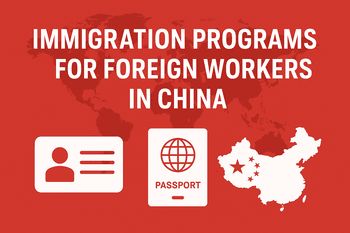
In this comprehensive guide, we delve into effective tactics and essential considerations for successfully negotiating your salary and benefits package in China.
Negotiating your salary and benefits package in China can be a daunting task, especially for expatriates unfamiliar with the local business culture. However, with the right strategies and understanding, you can secure a compensation package that reflects your worth.
Understanding the Chinese Business Culture
To effectively negotiate your salary in China, it’s crucial to understand the Chinese business culture.
Relationships, also known as Guanxi (关系), play a significant role in Chinese business practices.
Building strong relationships and demonstrating respect towards your employers are fundamental aspects of successful negotiations.
Research the Market Rate
Before entering into negotiations, research the market rate for your position within your industry in China.
Utilize resources such as job portals like Indeed.com or Glassdoor, salary surveys, and industry reports to gather data.
Understanding the average salary range for your role will provide a solid foundation for your negotiations and help you set realistic expectations.
Leverage Your Unique Value Proposition
Identify and articulate your unique value proposition. Highlight your skills, experiences, and accomplishments that set you apart from other candidates.
Emphasize how your expertise can contribute to the company’s success and justify a higher salary.
Prepare Thoroughly
Preparation is key to successful salary negotiations. Prepare thoroughly by considering the following steps:
- Know Your Worth: Evaluate your qualifications, experience, and skills objectively.
- Set Clear Objectives: Determine your desired salary range and benefits package.
- Anticipate Questions: Be ready to answer questions about your previous compensation and justify your salary expectations.
- Practice Your Pitch: Rehearse your negotiation pitch to communicate confidently and persuasively.
Timing Your Negotiation
The timing of your negotiation can significantly impact its outcome. Aim to negotiate after receiving a job offer but before signing the contract. This is when you have the most leverage. Additionally, consider the company’s fiscal calendar, as negotiating during budget planning periods might increase your chances of success.
Utilize Effective Communication Techniques
Effective communication is essential in salary negotiations. Utilize techniques such as:
- Active Listening: Pay attention to the employer’s concerns and respond thoughtfully.
- Assertiveness: Clearly state your expectations without being aggressive.
- Cultural Sensitivity: Be mindful of cultural nuances and adjust your communication style accordingly.
Highlighting Total Compensation
When negotiating, consider the total compensation package, not just the base salary. In China, benefits can include:
- Housing Allowance: Especially for expatriates, housing allowances can be a significant part of the compensation package.
- Healthcare Benefits: Ensure comprehensive health insurance coverage.
- Bonuses and Incentives: Performance-based bonuses can enhance your overall compensation.
- Vacation and Leave Policies: Negotiate for adequate vacation days and leave entitlements.
- Relocation Assistance: For expatriates, assistance with relocation expenses can be crucial.
Navigating Common Challenges
Negotiating in China comes with its own set of challenges. Be prepared to navigate common challenges such as:
- Language Barriers: If you’re not fluent in Mandarin, consider hiring a translator or negotiator.
- Cultural Differences: Understanding and respecting cultural differences is key to building rapport and trust.
- Employer’s Budget Constraints: Be prepared for the possibility that the employer may have limited flexibility due to budget constraints.
Building Long-Term Relationships
Fostering long-term relationships with your employer can be beneficial beyond the initial negotiation. Building long-term relationships involves:
- Demonstrating Commitment: Show your dedication to the company’s success.
- Ongoing Communication: Maintain open lines of communication with your employer.
- Continuous Improvement: Continuously develop your skills and contribute to the company’s growth.
Seek Professional Assistance
If you find the negotiation process overwhelming, consider seeking professional assistance. Career coaches, negotiation consultants, and expatriate support organizations can provide valuable guidance and support.
Conclusion
Negotiating your salary and benefits package in China requires a combination of thorough research, cultural understanding, and strategic communication.
By leveraging your unique value proposition, preparing thoroughly, and considering the total compensation package, you can successfully negotiate a deal that reflects your worth.
Remember to navigate cultural differences with sensitivity and build long-term relationships to ensure ongoing success in your career.



